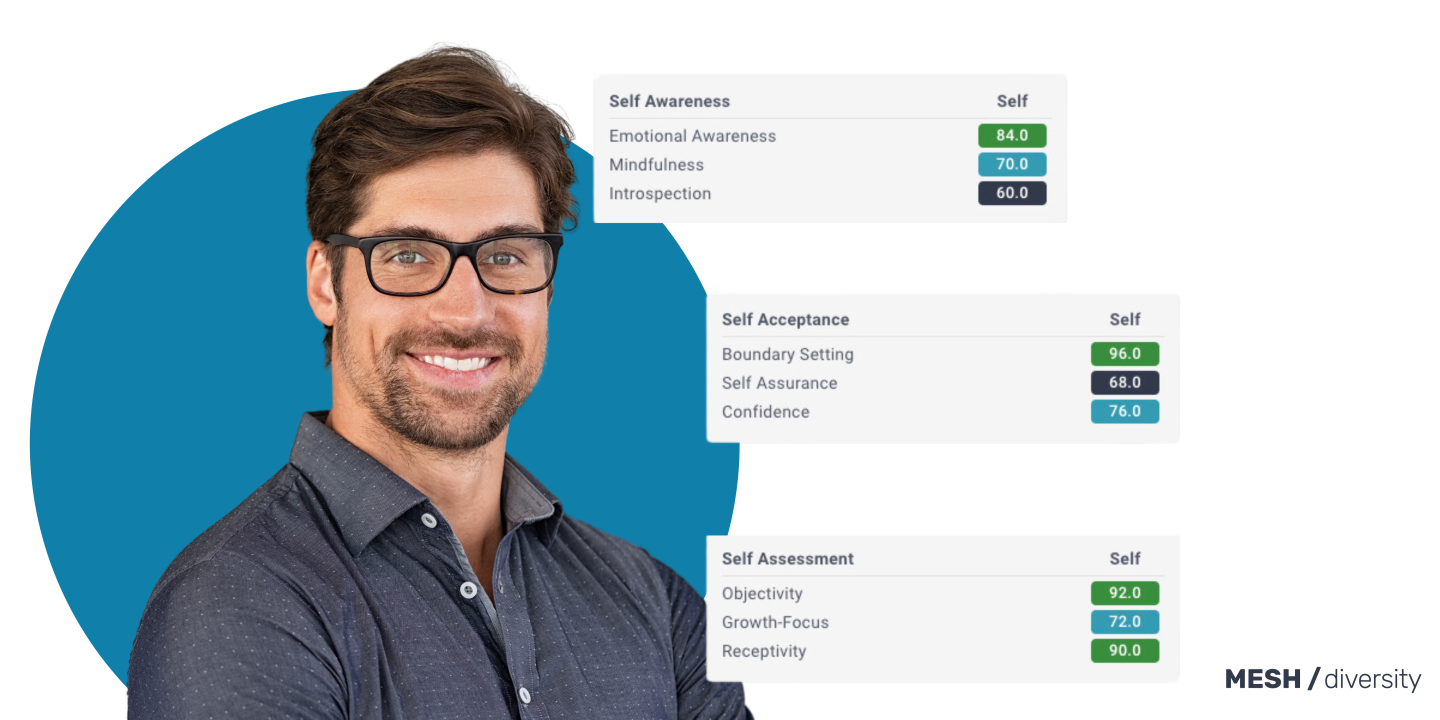The Power of Understanding Your Personal Baseline: Empowering People Managers to Become Exceptional Leaders and Colleagues

Are you familiar with the concept of Personal Baseline?
A Personal Baseline refers to a benchmark or starting point that represents an individual’s current level of performance, behavior, or state in a particular area of their life.
As HR leaders, it is our responsibility to ensure that our managers possess the necessary skills and qualities to lead their teams effectively. One crucial aspect often overlooked is understanding and developing one’s Personal Baseline.
A strong Personal Baseline, encompassing self-awareness, self-acceptance, and self-assessment, sets the foundation for managers to become exceptional leaders and trusted colleagues. At MESH, we consider three main elements to be part of your Personal Baseline: Self-Awareness, Self-Acceptance, and Self-Assessment.
Let’s unpack these three elements and highlight their importance in fostering personal growth and development:
Cultivating Self-Awareness
Self-awareness forms the cornerstone of effective leadership. By understanding their needs, desires, failings, habits, and drivers, managers gain valuable insights into their own behaviors and reactions. This awareness can be cultivated through three key elements:
- Emotional Awareness: Managers with emotional intelligence possess a keen understanding of their emotions and how they influence their actions. By acknowledging and managing their emotions, they can create a more positive and productive work environment.
- Mindfulness: The practice of mindfulness allows managers to be fully present in the moment, enabling them to observe their thoughts and reactions objectively. This self-reflection helps them make informed decisions and respond thoughtfully to challenges.
- Introspection: By engaging in regular introspection, managers can examine their thoughts, beliefs, and motivations. This deep level of self-reflection fosters personal growth, enabling them to identify areas for improvement and develop strategies to enhance their leadership abilities.
Embracing Self-Acceptance
Self-acceptance is the foundation upon which personal and professional growth can flourish. When managers are aware of their strengths and limitations, they can harness their strengths effectively and seek support or development in areas where they may fall short. The three elements that make up self-acceptance are:
- Boundary Setting: Effective managers know their boundaries and are skilled at setting them. They understand their capacity, priorities, and when to delegate or seek assistance, ensuring their well-being and that of their team.
- Confidence: Confidence is the belief in one’s abilities and worth. Managers who have confidence in themselves inspire trust and motivate their team members. This self-assurance empowers them to take calculated risks and tackle challenges head-on.
- Self-Assurance: Managers who possess self-assurance understand that mistakes are part of the learning process. They embrace failure as an opportunity for growth and remain resilient in the face of setbacks. This mindset encourages innovation and fosters a culture of continuous improvement.
The Power of Self-Assessment
An essential skill for professionals and especially for effective people leaders is the ability to self-assess. It allows them to recognize when a strategy is not working and adapt accordingly. The three elements that make up self-assessment are:
- Objectivity: Objective self-assessment enables managers to evaluate their performance, decisions, and behaviors impartially. They can recognize their strengths and weaknesses without bias, making more informed choices for personal and team development.
- Receptivity: Being receptive to feedback is crucial for growth. Managers who are open to constructive criticism and actively seek feedback create an environment that encourages open communication. They leverage feedback as a valuable tool for personal improvement and empowering their team.
- Growth-Focus: Managers who prioritize growth and development continuously strive to expand their knowledge and skills. They embrace new challenges, seek out learning opportunities, and inspire their team members to do the same. This growth mindset fosters innovation and drives organizational success.

There is a lot of power that comes from understanding your personal baseline, and top-performing leaders tend to have a firm grasp of these aspects of themselves. MESH helps organizations build better people managers and teams with the Inclusive Leadership Program, an expert-led training series that helps your people understand themselves better. Included in the program is access to the MESH Platform which gives you tangible data on 36 behavioral traits and AI-Powered recommendations to help your team navigate their journey towards self-improvement and building an inclusive work environment.
Want to learn more? Schedule a no-commitment call with our team today.